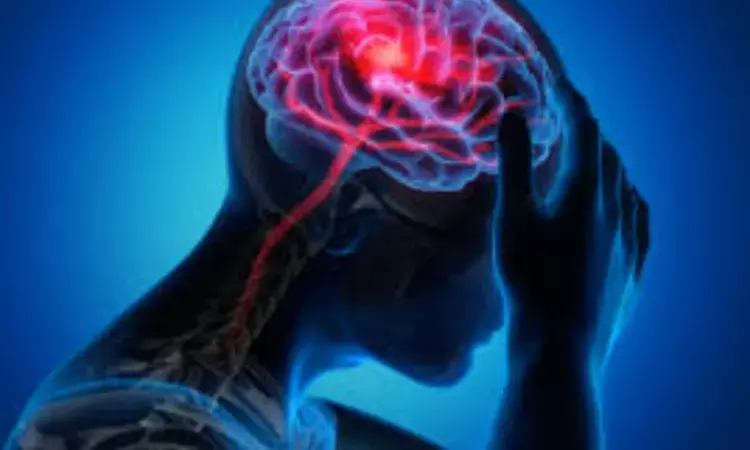- Home
- Medical news & Guidelines
- Anesthesiology
- Cardiology and CTVS
- Critical Care
- Dentistry
- Dermatology
- Diabetes and Endocrinology
- ENT
- Gastroenterology
- Medicine
- Nephrology
- Neurology
- Obstretics-Gynaecology
- Oncology
- Ophthalmology
- Orthopaedics
- Pediatrics-Neonatology
- Psychiatry
- Pulmonology
- Radiology
- Surgery
- Urology
- Laboratory Medicine
- Diet
- Nursing
- Paramedical
- Physiotherapy
- Health news
- Fact Check
- Bone Health Fact Check
- Brain Health Fact Check
- Cancer Related Fact Check
- Child Care Fact Check
- Dental and oral health fact check
- Diabetes and metabolic health fact check
- Diet and Nutrition Fact Check
- Eye and ENT Care Fact Check
- Fitness fact check
- Gut health fact check
- Heart health fact check
- Kidney health fact check
- Medical education fact check
- Men's health fact check
- Respiratory fact check
- Skin and hair care fact check
- Vaccine and Immunization fact check
- Women's health fact check
- AYUSH
- State News
- Andaman and Nicobar Islands
- Andhra Pradesh
- Arunachal Pradesh
- Assam
- Bihar
- Chandigarh
- Chattisgarh
- Dadra and Nagar Haveli
- Daman and Diu
- Delhi
- Goa
- Gujarat
- Haryana
- Himachal Pradesh
- Jammu & Kashmir
- Jharkhand
- Karnataka
- Kerala
- Ladakh
- Lakshadweep
- Madhya Pradesh
- Maharashtra
- Manipur
- Meghalaya
- Mizoram
- Nagaland
- Odisha
- Puducherry
- Punjab
- Rajasthan
- Sikkim
- Tamil Nadu
- Telangana
- Tripura
- Uttar Pradesh
- Uttrakhand
- West Bengal
- Medical Education
- Industry
High-Risk ABCD2 Scores Linked to Increased Long-Term Stroke Risk After TIA : Study

Researchers have found that with high-risk ABCD2 scores, the long-term risk of ischemic stroke after a transient ischemic attack (TIA) is significantly increased. It is well known and established that TIA boosts the short-term risk of stroke but long-term data on this issue have not been available. A recent study was thus conducted by Katia and colleagues which was published in the journal Neurology.
The study was conducted using data from the Danish Stroke Registry. The study population included patients aged 18 years or older who experienced a first-time TIA between 2014 and 2020. Patients were categorized into high-risk (ABCD2 score ≥4) and low-risk (ABCD2 score <4) groups.
The ABCD2 score incorporates age, hypertension, clinical features, and diabetes. Long-term outcomes were assessed at 3 years, particularly the cumulative incidence of stroke, and all-cause mortality at the end. Aalen-Johansen and Kaplan-Meier methods assessed long-term outcomes. Multivariate Cox regression models determined the factors associated with stroke risk over 3 years.
Of the 21,433 patients included, 1,280 (6.0%) were placed in the high-risk category, and 20,153 (94.0%) were placed in the low-risk category. There was also an important demographic difference: patients in the high-risk group were on average older, with a median age of 77.5 years compared with 70.3 in the low-risk group.
High-risk patients had a higher burden of comorbid conditions, including ischemic heart disease, heart failure, and atrial fibrillation and were more likely to take medications such as antiplatelet therapy, oral anticoagulants, and cholesterol-lowering drugs.
Key Findings
• Stroke Risk: The 3-year cumulative incidence of ischemic stroke was 6.0% (95% CI 4.6–7.5) in the high-risk group, compared to 4.2% (95% CI 3.9–4.5) in the low-risk group (p = 0.004).
• Mortality Rates: The 3-year cumulative all-cause mortality was significantly higher in the high-risk group (28.9%, 95% CI 26.1–31.7) than in the low-risk group (10.3%, 95% CI 9.9–10.8).
• Associated Factors: Age ≥60 years (HR 2.21), current smoking (HR 1.37), unilateral weakness (HR 1.25), peripheral artery disease (HR 1.53), and chronic kidney disease (HR 1.39) were independently associated with higher stroke risk.
The findings in this large population-based study showed that the high-risk ABCD2 score was significantly associated with increased long-term risk of ischemic stroke after TIA. It highlights the importance of early identification and management of at-risk individuals to prevent further strokes and improve health outcomes in the long run.
Reference:
Al-Chaer, K., Alhakak, A., Vinding, N. E., Butt, J. H., Karacan, M. N., Johnsen, S. P., Kruuse, C., Schou, M., Torp-Pedersen, C., Køber, L., & Fosbøl, E. (2024). Incident stroke after first-time TIA according to ABCD 2 score: A nationwide cohort study. Neurology, 103(12). https://doi.org/10.1212/wnl.0000000000210053
Dr Riya Dave has completed dentistry from Gujarat University in 2022. She is a dentist and accomplished medical and scientific writer known for her commitment to bridging the gap between clinical expertise and accessible healthcare information. She has been actively involved in writing blogs related to health and wellness.
Dr Kamal Kant Kohli-MBBS, DTCD- a chest specialist with more than 30 years of practice and a flair for writing clinical articles, Dr Kamal Kant Kohli joined Medical Dialogues as a Chief Editor of Medical News. Besides writing articles, as an editor, he proofreads and verifies all the medical content published on Medical Dialogues including those coming from journals, studies,medical conferences,guidelines etc. Email: drkohli@medicaldialogues.in. Contact no. 011-43720751


